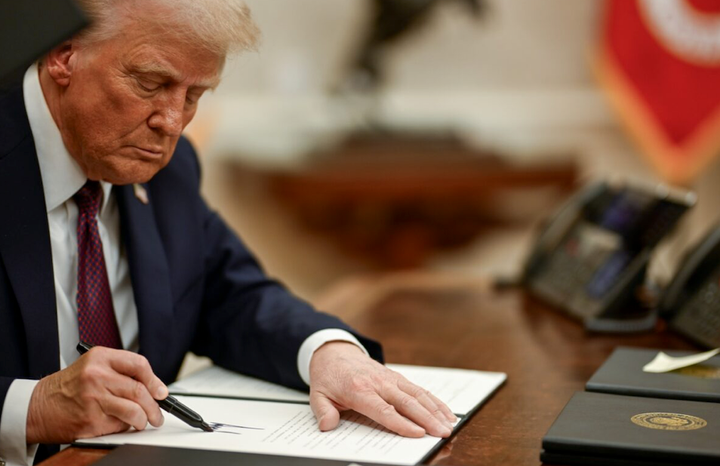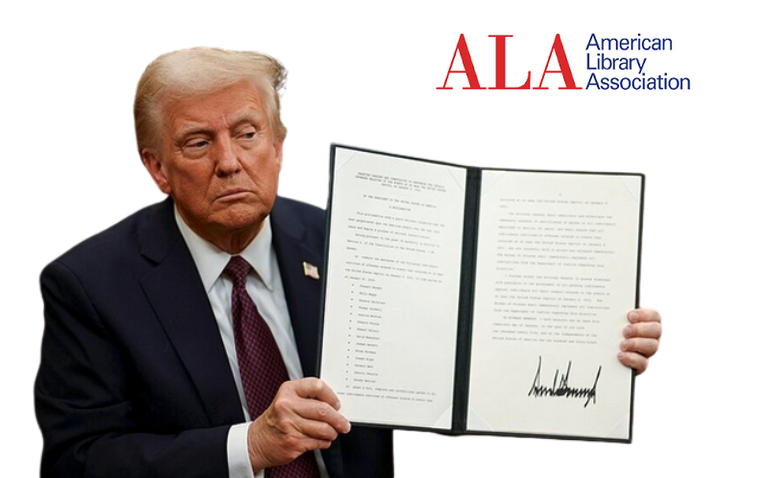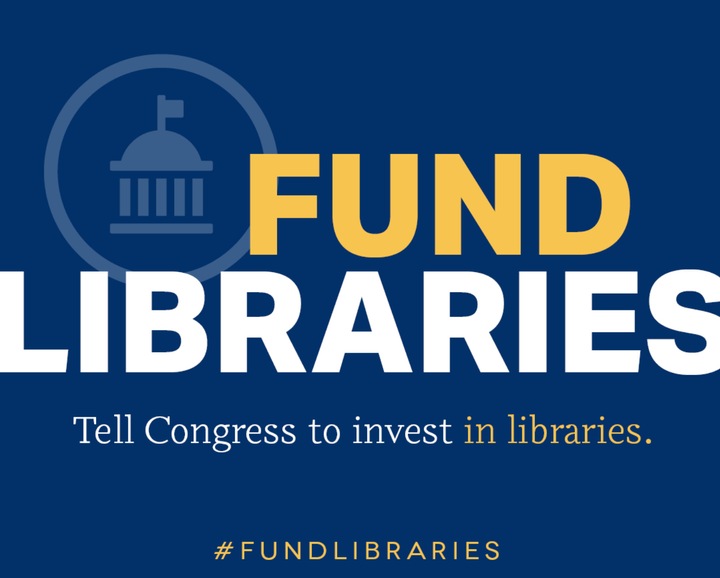The Queue: Library News for the Week Ending April 25
Among the week's headlines: The Supreme Court hears a potential landmark case about books with LGBTQ+ themes; North Dakota governor vetoes the state's book banning bill; and two new library-related documentaries are set to debut.
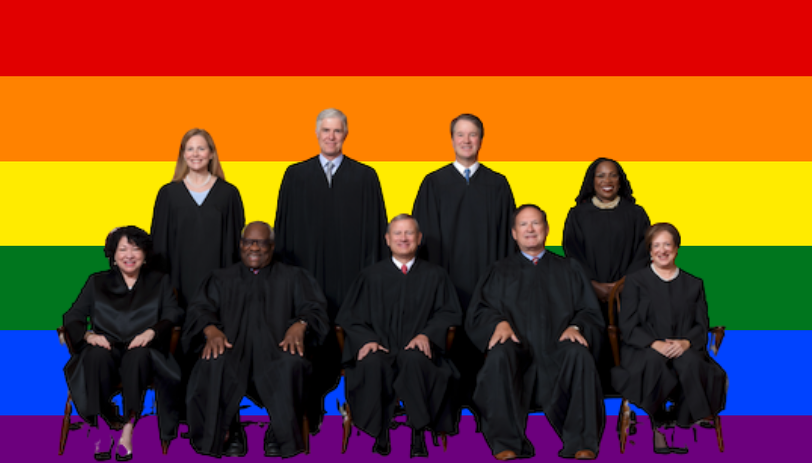
On April 22, the Supreme Court heard oral arguments in a potentially landmark case, Mahmoud v. Taylor, which could pave the way for parents to opt their children out of school lessons that include LGBTQ+ books, on religious grounds. And by most accounts, the court appears poised to side with the parents.
My go-to for Supreme Court coverage is the excellent Scotusblog, where Amy Howe has an great rundown of the lengthy, two and half hour oral argument bluntly titled Supreme Court Likely to Rule for Parental Opt-out on LGBTQ Books in Schools.
“Justice Amy Coney Barrett suggested that the teaching of the content in the storybooks might amount to more than mere exposure," Howe reports. The court’s Democratic appointees, meanwhile, "expressed concern that the parents’ proposed rule would have a wide sweep, giving them broad discretion to opt out."
Howe then seized on what I also thought was a key point in the argument. “Is the key question that: when a religious person confronts something in a classroom that conflicts with her parents’ religious beliefs, then the parent can opt [the student] out?” Justice Elena Kagan asked the lawyer for plaintiff parents. When told that, yes, it was, Kagan "worried aloud" that parents will at some point conclude "that it is unfair for their children to have to leave the classroom to avoid the materials to which they object, leading to a challenge to the materials themselves.”
Reporters at CNN had a similar take on the day's argument: Supreme Court’s Conservatives Are Poised to Strike Down Elementary School Policy Denying Opt-outs for LGBTQ+ Books.
The New York Times did as well: Justices Seem Set to Allow Opt-Outs From L.G.B.T.Q. Stories in Schools.
And NPR: Supreme Court Leans Toward Parents Who Object to LGBTQ Books in Public Schools
You can listen to the full Supreme Court oral argument and read the transcript here.
For a good explainer on the importance of the case, the Authors Guild, The Educational Book & Media Association, and Big Five publisher Penguin Random House submitted an excellent amicus brief. (Though, one does wonder why the other Big Five publishers aren't signed on to this brief?). “It is never a good time to countenance—much less to incentivize—the removal of books from public school classrooms and libraries based on the ideas contained in them,” the brief states. “But we are now at an especially fraught moment in our history, as book removal initiatives—couched as attempts to shield children and young adults from harmful subjects and dangerous ideas—are wreaking havoc on school districts and public libraries across the country.”
In a release, PEN America also shared their reaction to the oral argument. Requiring opt-outs “could result in books with [LGBTQ] themes being eliminated altogether from classrooms across the country—a avowed goal of the movement to ban books in schools that PEN America has tracked since 2021, counting more than 16,000 instances nationwide,” the PEN release states.
Making Headlines...
Good news out of North Dakota, where The North Dakota Monitor reports that Governor Kelly Armstrong has vetoed Senate Bill 2307, a library content bill, calling it “a misguided attempt to legislate morality through overreach and censorship.” In that the bill narrowly passed in both chambers, the Monitor reports that it is unlikely lawmakers will attempt to override the veto. If passed, the bill, would have required school and public libraries to move books deemed sexually explicit, and would have exposed librarians and educators to legal jeopardy. Armstrong's pointed and sober veto statement (below) is well worth a read. “I don’t pretend to know what the next literary masterpiece is going to be,” Armstrong wrote. “But I know that I want it available in a library.”
Meanwhile, in South Dakota, talk about a roller coaster ride. The South Dakota Searchlight reports that state lawmakers had recently reached a deal to spare the state library, at least in terms of its services, after then Governor Kristi Noem had proposed slashing its budget. But then came Trump's executive order to slash the IMLS, putting the state's grant funding in jeopardy. But apparently South Dakota is one state that will get it's IMLS fuding. The article notes that State Librarian George Seamon "got notice that South Dakota’s grant IMLS funding is on the way," the paper reports. "The librarian told the board that IMLS had released half the money, and asked for documentation of the library’s operational plans to release the other half."
Lots of articles about the impact of the IMLS cuts in local media. But over at Katina, Thomas Padilla shares some of the stories he’s collected from people about how the IMLS matters to them. “On April 1, I created IMLS Matters. It is a place for people to share stories of how IMLS matters to them. In a short period of time people have shared stories from across the country—more than 20 different states represented so far,” Padilla writes. “Stories are powerful. They are one of the oldest technologies we use to achieve solidarity. Solidarity is fundamental to individual and collective action.”
Meanwhile, as we reported this week, DOJ lawyers have suggested the IMLS isn't really being shut down as critics claim, but that its resources are in the process of being realigned with Trump administration priorities. Perhaps realigned like this: On April 24, the NEH and NEA officially announced that, in "preparation for the nation’s celebration of the 250th anniversary of the Declaration of Independence in 2026," the two agencies are allocating some $34 million to support "the design and creation of statues of important American historical figures" for the planned National Garden of American Heroes. "First proposed by President Trump in 2020, the National Garden of American Heroes sculpture garden will feature life-size statues of 250 great individuals from America’s past who have contributed to our cultural, scientific, economic, and political heritage."
The announcement comes two weeks after the New York Times reported that the agencies would "redirect some of its funding" to build the garden, after they "abruptly canceled more than 85 percent of its existing grants, which support museums, historical sites and scholarly and community projects across the country," moves that "outraged supporters of the humanities, and stirred speculation about whether the agency would survive." Observers like John Chrastka at EveryLibrary, and Book Riot's Kelly Jensen have been warning about the connection between the 250th celebration and the future of IMLS and other cultural agencies. And this is definitely worth paying close attention to.
"Centralized planning for the 250th anniversary, as outlined in Executive Order 14189, could lead to ideological litmus tests for federal funding of local and state archives, museums, and libraries," Chrastka warned in his recent article for The Political Librarian. "These actions suggest a shift towards funding criteria that prioritize alignment with a specific narrative of American history and identity."
Lehigh Valley Live reports that residents expressed dismay at a public meeting this week over the recent politicization of the Warren County public library's board. "Residents from Hope, Harmony and Greenwich townships said they are concerned members of the Warren County Library Commission are political appointees getting in the way of the library’s regular operations," the article notes. "They accused the commission of being uninformed about the library’s programming, responsibilities and financial challenges. They said some commissioners were over preoccupied with the buildings’ reading materials instead."
In Wyoming, WyoFile reports that former Campbell County Public Library director Terri Lesley, who was fired from her job in July 2023 after refusing to censor LGBTQ books has filed “a new federal lawsuit against the county, its board of commissioners, the library board and individual members of both government boards.”
The suit comes after Wyoming Judge Alan Johnson earlier this month ruled that Lesley’s lawsuit against a local family she accuses of harassing her can proceed. The article also notes that the Wyoming legislature is considering taking action on diverse library books. “The Legislature’s Joint Judiciary Committee has taken on the state’s obscenity laws as a topic to study from now until the 2026 legislative session, and conservative lawmakers will likely push for laws banning books that discuss sexuality from libraries where they can be accessed by minors,” the article states.
The Alabama Political Reporter reports that the Fairhope Public Library board is standing firm on the freedom to read, voting this week to keep two challenged books in the teen section, despite the Alabama Public Library Service asserting that the library “is not in compliance with state code requiring sections for children and teens to be free from ‘sexually explicit’ material.” The two books are Grown by Tiffany Jackson and Sold by Patricia McCormick. The news comes after state’s public library service abruptly voted last month to defund the Fairhope Public Library for its refusal to pull certain books from its shelves, leading to a fundraiser sponsored by Read Freely Alabama and EveryLibrary raised enough money to cover the cuts.
In Texas, The Amarillo Globe News reports that a “packed chamber,” heard nearly four hours of emotional public comment at an Amarillo City Council meeting, as residents “debated the city's handling of three books challenged for their content” at the library. The books in question: The Bluest Eye by Toni Morrison; The Every Body Book by Rachel Simon; and Gender Queer by Maia Kobabe. “After review, the Amarillo Library Advisory Board voted to retain the first two in their current sections and to reclassify Gender Queer from the young adult section to adult,” actions that prompted the appeal to the city council, the report notes. “The majority of speakers urged the council to uphold the Library Advisory Board’s decision, saying the books in question provide life-saving insight and support for youth exploring complex personal topics.”
And finally this week...
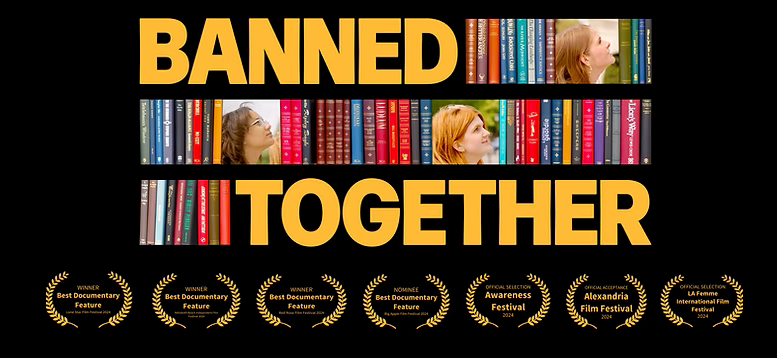
Let's go to the movies! Two long-awaited documentaries about libraries are about to hit your screens.
First up, IndieWire this week has a piece about the new film Banned Together. directed by Kate Way and Tom Wiggin. The film, which is out today, April 25 “follows three students in Beaufort, South Carolina who fought back when 97 books were pulled from their school’s library.” And also notable: it’s the first original film title from Kanopy, the OverDrive-owned library streaming service.
“Kanopy came aboard Banned Together about two years ago when the film was just beginning production. And while the film seemed like the perfect fit, the decision to branch into originals was hatched hand in hand with becoming a co-producing partner on the documentary,” IndieWire notes. “Up next for Kanopy: an original, unscripted series called America’s Next Great Author. [Kanopy CEO Jason Tyrell] says it’s The Voice, but for authors, and it’s created and hosted by bestseller Kwame Alexander. The series is in development now and will air in 2026.”
And next up, the PBS series Indepedent Lens will air Free for All: The Public Library next week. From filmmakers Dawn Logsdon and Lucie Faulknor, the movie tells the story of "the quiet revolutionaries who made a simple idea happen. From the pioneering women behind the 'Free Library Movement' to today's librarians who service the public despite working in a contentious age of closures and book bans, meet those who created a civic institution where everything is free and the doors are open to all."
Free for All debuts on Independent Lens on Tuesday, April 29.
Alison Marcotte has a nice interview with the filmmakers this week over at American Libraries.
"I would want to quote Crosby Kemper III, [former director of the Institute of Museum and Library Services], who—at the end of our film—says we need more places like libraries where people come together to agree to disagree, disagree to disagree, or find agreement," says Logsdon, when asked how libraries reflect today’s political climate. "It’s one of the last places where we can actually hash these things out in a civil way, most of the time."
